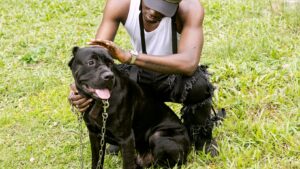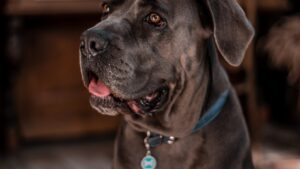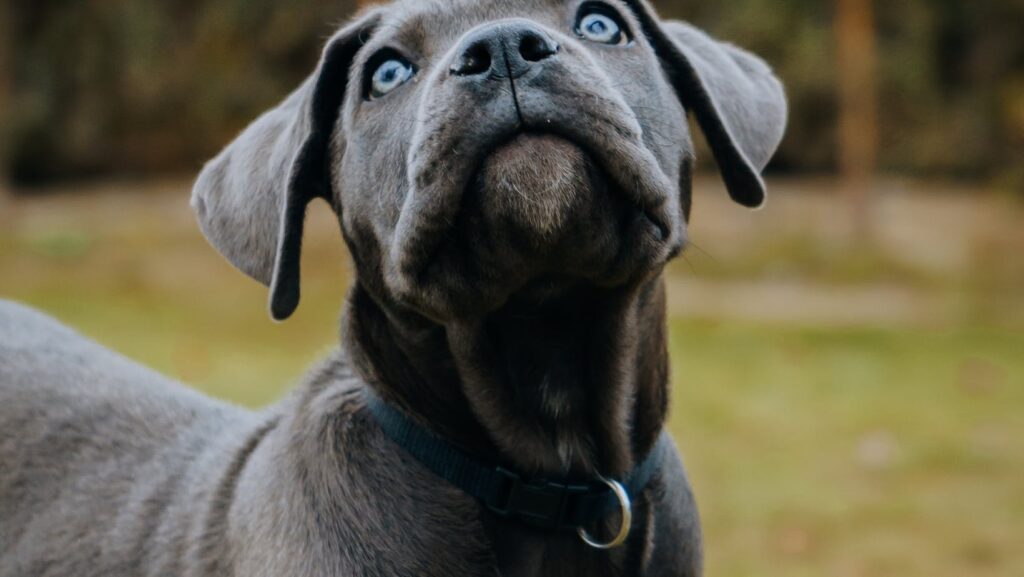Meet the Cane Corso, a dog breed with a rich history and an imposing presence. Known for their strength, intelligence, and loyalty, these Italian mastiffs are gaining popularity worldwide. Yet, beneath their powerful exterior lies an adorable charm that endears them to their owners. Despite their formidable size, Cane Corsos exhibit a surprisingly adorable and functional gentleness, especially with family members and children.
Mastiff:1bf6z8nitca= Cane Corso

Illustrious in their bulky appearance and gallant disposition, Cane Corsos exhibit a notable variety of unique characteristics, both physical and behavioral. This unique breed’s traits sets them apart from other pups.
Strictly tailored by historical demands on the battlefield, every inch of the Cane Corso reflects strength and durability. This breed usually stands between 23.5 and 27.5 inches at the shoulder, displaying a muscular physique with an expanse of fur covering the body ranging from fawn to black. Their innate strength gets highlighted by their broad chest, powerful neck, and robust limbs. The distinctive head stays squarely medium-length, characterized by powerful jaws and a pronounced stop, coupled with ears that are either small and triangular if cropped or medium-sized and hanging down naturally.
Training and Care Requirements

Utilizing a consistent and structured training approach, coupled with positive reinforcement, proves advantageous in capturing a Cane Corso’s attention and stimulating their intellect. It’s an intelligent breed that responds well to an assertive yet kind leader. Include varied activities, like obedience training or hide-and-seek games to create mental challenges. This breed benefits greatly from early socialization experiences, promoting well-rounded behavior towards other pets and humans. Aggressive behavior can manifest, if left unchecked, due to their natural protective instincts. Hence, ensure a balance between discipline and affection to inhibit any adverse behavior.
A Cane Corso thrives on high-quality dog food, rich in protein and low in fillers. They possess a robust appetite aligning with their active lifestyle. Feed them in two separate meals to best manage their gastric health; avoid feeding large meals, as this breed is prone to gastric torsion or bloat. Incorporate supplements, such as glucosamine for joint health given their risk for hip dysplasia. Regular wellness checks with a veterinarian observe potential health concerns like eye ailments or cardiac conditions. Hand-in-hand with feeding, daily exercise remains a cruical aspect of their overall health, ensuring both body and mind are actively engaged. This breed is not overly demanding in terms of grooming; regular brushing suffices to keep their short coat healthy and clean. As a final caveat, remember that individual dog needs may vary. Training and care guidance may be tweaked, based on ensuring that the Cane Corso’s overall health and well-being remain the top priority.
Cane Corso As a Family Pet

Remain cognizant that Cane Corsos, being assertive and muscular breeds, interact well with family members, including children. They show a high tolerance, especially when exposed early to children. These dogs, often mentioned for their gentle handling of kids, maintain a protective stance around their younger counterparts. Remember, for households with other pets, successful cohabitation lies in the pup’s early socialization. Decent exposure to other pets during puppyhood usually results in harmonious relationships in adulthood.
Understand that the Cane Corso bears a strong protective instinct towards its family members. This attribute, though admirable and comforting for owners, requires careful management. Regular socialization from a young age helps curb potential overly protective behavior. Expose the dog to various social scenarios, involving different people and environments. This exposure facilitates a balanced temperament, promoting a healthy protective instinct rather than aggressive behavior.
Gallant Guardian
The Cane Corso is indeed a breed that’s as gallant as they come. With their historical roots tracing back to ancient Rome, they’re a testament to strength and loyalty. They’re not just physically robust but intelligent, calm, and vigilant too. It’s clear that early socialization plays a vital role in managing their protective instincts, shaping them into loving family members who stand guard for their loved ones.

